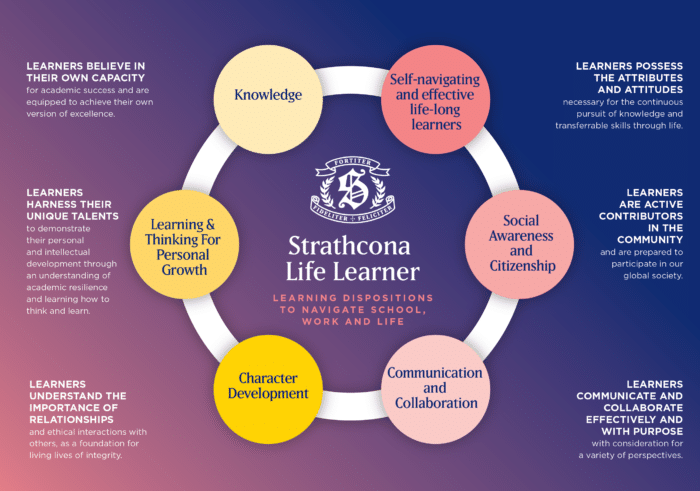We are proud to introduce the school community to The Strathcona Life Learner.
This is a visual representation of our core set of learning goals – goals that support the development of key attributes, essential skills and habits of mind that define learning experiences at Strathcona and beyond.
It provides a bridge between our mission and programs, helping our community and the world beyond our school to understand the vision and goals we have for our students. It helps to clarify what we want all our learners to acquire and why we are committing to personalised and independent pathways that ensure all students reach mastery and have success.
The aim of this is to outline a common understanding and language around learning behaviours in the context of Strathcona from ELC- Year 12, that teachers and students can work towards within their classes, the co-curricular program and the school as a whole.
As such, the Life Learner Framework aims to be holistic to not only emphasise the sequential teaching and development of these complex competencies but to incorporate the knowledge, character and values that support these.
Informing the development of this model was the Organisation for Economic Co-operation and Development’s OECD Future of Education and Skills 2030 Position Paper: The Future We Want which provided an international perspective. The key question posed is: What knowledge, skills, attitudes and values will today’s students need to thrive and shape their world?
The OECD learning compass provides points of orientation towards the future we want for learners and their individual and collective well-being, emphasising the need for students to learn to navigate by themselves, through unfamiliar contexts.
There is also growing consensus that 21st Century skills, or general capabilities as they are called in Australia, need to be explicitly cultivated to help learners succeed in a modern society based on knowledge and innovation. Having an explicit representation of the complex learning capabilities and skills is thought to predict success in further study or work. (Milligan, Luo, Hassim, Johnson, 2021, Future-Proofing Students: What they need to know and how educators can assess and credential them (An MGSE Industry Report). Furthermore, development of skills is critical to produce holistically developed students who can learn effectively and engage in the workplace and with each other.
The thinking of Professor Michael Fullan from the Ontario Institute for Studies in Education, University of Toronto and the Global Leadership Director, New Pedagogies for Deep Learning was also used to inform the Framework’s aspirational dimensions and learner behaviour descriptors. The Victorian and Australian Curriculum has always specified the key competencies of Collaboration, Communication, Critical Thinking and Creativity. However, Fullan argues that students need to develop Six Global Competencies or the 6Cs rather just the four, to include Citizenship and Character Development. These are all critically important if we hope to prepare students for their future and the acceleration of technologies and changes to life as we know it, taking place in this fourth industrial revolution. Fullan defines these traits as deeper learning competencies and the development of our understanding of these will reinforce deeper and richer learning experiences for our learners; ones that are engaging, relevant and authentic.
As a consequence, utilising new ways of working, new ways of living, and new ways of learning are reliant on shifts in curriculum, pedagogy and assessment, to accommodate those changes. Our Strathcona Life Learner provides the compass for us to do that.







